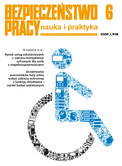Requirements and conditions of lifeguards’ work vs. their perception by users of swimming places
Iwona Michniewicz, Romuald Michniewicz
Lifeguards are often young people who have just begun their career. The responsibility they shoulder along with several factors distracting from or disrupting their basic duties may cause reduced security at the swimming place they are responsible for. An average member of the public seldom realizes how stressful lifeguards’ work is and what risk it carries. Even though lifeguards seem to guarantee safety and security, swimmers often evaluate them poorly.
Sinus pressure injury in the underground mining – case study
Paweł Panajew
A paranasal sinuses barotrauma case occurred in underground copper mine have been discussed in the paper. Basically, such cases have been usually described in published sources in relation to diving or aviation. Barotrauma is a combination of two Greek words: báros – burden and traúma – wound or injury. For the medical sciences and lifesaving a synonym pressure injury (PU) has been adopted. The main reason of PU occurrence is the lack of patency in one of the sinuses connecting the sinus to the nose during a sudden atmospheric pressure change. The cause of the injury, the course of medical treatment and the consequences of the arisen accident were described in the paper. Finally, an attempt of the PU risk occurrence has been assessed for the three groups of persons potentially vulnerable for such opportunity.
Using OCRA to assess external load of the musculoskeletal system at a repetitive workstation
Patrycja Łach, Danuta Roman-Liu
This article discusses using OCRA in practice to assess risk during repetitive work involving upper limbs. Risk was assessed at an assembly line workstation. It is important for risk assessment of load at repetitive workstations to be well done, so that it is possible to identify and reduce the risk of work-related complaints. After all, there are many workstations where it is necessary to repeat tasks.
Material responsibility of employees: the Labour Code
Justyna Kornaszewska
Employees’ responsibility for property entrusted to them by the employer is a major problem in the field of labour law. Employees do not always perform their work the way their employer would like them to. In all areas of economic life, employees’ actions can result in damage sustained by the employer or third parties. If an employee is at fault, the employer can seek the damage to be redressed either out-of-court or in court. Sometimes, breach of employment duties, which caused damage, can make the employer decide to terminate employment. Even if the employer terminates employment with notice or under art. 52 of Poland’s Labour Code, it is still necessary to collect payment as damages, which the employee should cover. Employees who will identify and prove circumstances, which have resulted in damage due to reasons beyond their control may be released from their liability. It is also possible to limit employees’ liability for all or part of the damage to property entrusted to them. Employees’ responsibility for property entrusted to them by the employer is strongly related to the provisions and principles of occupational safety and health (OSH). Employees who ignore the provisions and principles of OSH have to reckon with the consequences in the form of being held responsible, having their employment terminated or even having their employment terminated without notice due to their fault (art. 52 § 1 point 1 of Poland’s Labour Code).





























